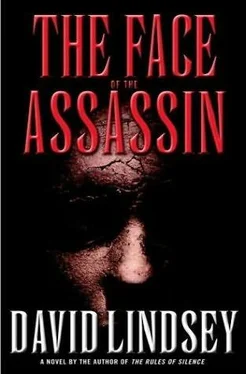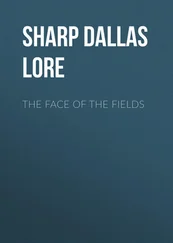David Lindsey - The Face of the Assassin
Здесь есть возможность читать онлайн «David Lindsey - The Face of the Assassin» весь текст электронной книги совершенно бесплатно (целиком полную версию без сокращений). В некоторых случаях можно слушать аудио, скачать через торрент в формате fb2 и присутствует краткое содержание. Жанр: Триллер, на английском языке. Описание произведения, (предисловие) а так же отзывы посетителей доступны на портале библиотеки ЛибКат.
- Название:The Face of the Assassin
- Автор:
- Жанр:
- Год:неизвестен
- ISBN:нет данных
- Рейтинг книги:4 / 5. Голосов: 1
-
Избранное:Добавить в избранное
- Отзывы:
-
Ваша оценка:
- 80
- 1
- 2
- 3
- 4
- 5
The Face of the Assassin: краткое содержание, описание и аннотация
Предлагаем к чтению аннотацию, описание, краткое содержание или предисловие (зависит от того, что написал сам автор книги «The Face of the Assassin»). Если вы не нашли необходимую информацию о книге — напишите в комментариях, мы постараемся отыскать её.
The Face of the Assassin — читать онлайн бесплатно полную книгу (весь текст) целиком
Ниже представлен текст книги, разбитый по страницам. Система сохранения места последней прочитанной страницы, позволяет с удобством читать онлайн бесплатно книгу «The Face of the Assassin», без необходимости каждый раз заново искать на чём Вы остановились. Поставьте закладку, и сможете в любой момент перейти на страницу, на которой закончили чтение.
Интервал:
Закладка:
“I think you know Ghazi Baida… intimately, Judas,” Sabella said, “the smell of his breath, the way he understands the color of light, the way he tastes something… the way he hates. I think you know… every tiny thing about him. You have memorized him from dossiers. You know his shoe size. You know the women he’s slept with. You know the brand of cigarettes he smokes, and you know how many he smokes a day.”
Bern sipped his coffee. He felt sweat popping out along his hairline. He saw faint shadows behind Sabella, clumps of fog prowling along the street. He felt not entirely within himself, as if he were pulling loose from his own personality, the discombobulated Dr. Jekyll.
Sabella lifted his chin in a kind of acknowledgment and went on.
“You know, too, that we have not been able to find out a damn thing about you, my friend. Nada. You appear, in fact, to be Judas Teller. An artist. A smuggler. A fucker of many women. A loner. A nobody much. Perhaps a bitter man.”
Now Sabella sipped his own coffee. He swallowed, nodded to himself.
“But… Baida smells you, Judas. He smells the shit on you. He doesn’t care what he can’t prove; he knows what he knows. Ghazi is not an idiot.”
His face didn’t change. He didn’t blink. His voice was curiously pensive, with no edge to it, no urgency.
“What is it?” Sabella asked. “They want to kill him? Is it you? Are you supposed to do it yourself? It’s not the right time yet? Not the right place? And Mexico makes it more difficult for you, doesn’t it? Maybe it has to look like something else. It wouldn’t do for the CIA to be involved in an assassination scandal in a country so close. So there has to be some elaborate planning. That takes time. Not easy, huh?”
Bern watched Sabella’s face, and he knew what was happening. Sabella was giving him a polygraph test, his own version of that dubious examination. He had seen this kind of penetrating scrutiny too many times on Alice’s face, the impaling gaze that saw the unseen, that read the unreadable, the gaze that crawled inside the head, and even inside the heart, and sniffed out the lie. After more than twenty years of running and hiding with Baida, Sabella’s whole being had become a trembling sensor for the lie. It had kept them alive, this tremulous humming within him, attuned to deceit. Bern remembered reading the incisive interviews that Jude had had with Sabella before Baida even showed his face. Extraordinary.
“I don’t know,” Bern said. “But I think there’s a big misunderstanding here.”
Something changed in Sabella’s face, subtle, hardly there at all, Bern couldn’t even describe it, but he knew that Sabella had just gotten the answer that he knew was there all along.
Sabella leaned forward, lowered his voice.
“Ghazi Baida wants to make a deal,” Sabella said.
Bern swallowed. He couldn’t help it. He didn’t even have the presence of mind to take a sip of coffee to cover it.
“A deal,” Bern said. What did he do with this? He was numb. He couldn’t make his mind put together a response.
“He wants you to kill him,” Sabella said. “He wants you to put him out of his misery. And in return, he will spare ten thousand American lives.”
Chapter 36
Jude would listen. Bern had no doubt of that. But he knew, as surely as Jude would have known, that there was a downside. If he listened, he would practically be admitting that he was who Sabella suspected him of being. If he wasn’t, he wouldn’t listen, because he would know damn well that in this business, knowing too much would get you killed.
Bern cursed himself for not being able to read Sabella’s face. Though he had made his living studying faces, his recent experiences with Alice had taught him that despite his experience, he had never really penetrated the face’s deeper dimensions. He knew bones. He knew tissue and muscle. He knew the mechanics of tension and structure and elasticity. But he had never gone beyond that; he had never seen the unseen like Alice, like Sabella himself. At this moment, he could see only that Sabella’s face had softened, that it had changed, but that was all. He couldn’t explain the inner landscape, or decipher the hidden story.
Whatever this man was about to say on Ghazi Baida’s behalf, it would have been a surprise to Jude. No one-not Kevern, not Mondragon, not anyone in Washington-would have expected Ghazi Baida to turn around and face his enemy-and appeal to him for help.
“Ghazi and I have worked together for a long time, Judas,” Sabella began. “Almost from the beginning. I met him shortly after Rima Hani was killed, and he was like a man on fire. Hatred emanated from him like a molten aura.”
Sabella’s assumption that Bern would know who Rima Hani was demonstrated how sure he was of Jude’s real role.
“We were young warriors together. Of course, I recognized immediately that I had none of Ghazi’s brilliance. Ghazi was exceptional-his ability to innovate, to see things that others couldn’t see, to imagine things others could not imagine. Those are Ghazi’s gifts, and he has used them well and selflessly in the service of Allah for these twenty years.”
He had lowered his voice yet again. They might be alone, but for Sabella, alone was never alone enough.
“My talents were more humble,” he continued, “but they were necessary to Ghazi’s success. Hundreds of us have happily served his vision, working in our own small ways to make it a living reality.
“But everyone has enemies, and men like Ghazi have more than most. Not only do leaders of Western governments want to see him dead but so do some in rival factions of Islam’s armies. Life has become very difficult, almost impossible. Like an old lion, Ghazi is having to devote more and more of his energy to just staying alive.”
Sabella paused to sip his coffee, but his eyes never left Bern; their intensity never subsided.
“But from great trials come great opportunities,” Sabella said. “Let me explain. There are plans,” he said tentatively, carefully testing the water, “that your government should know about. There are developments going on even now that it would be fatal for your country to overlook. Ghazi has a sensitivity to such things, having lived as both American and Arab; he sees many sides to both worlds. He knows how both sides think.
“In the months following the events of September eleventh, he saw a country that most Arabs didn’t see. He told me that it was like watching someone and being able to see his skeleton. Ghazi has always said that in revolution, as in life, success depends upon one’s ability to see beyond the obvious. The obvious is reality’s whore. Anybody can have her, but only fools believe it’s love.”
The two men had been watching each other closely, but it was just beginning to dawn on Bern that Sabella was under a lot of pressure. His controlled demeanor was only a disguise. Being Ghazi Baida’s lieutenant and intermediary was a punishing role.
“I can give you an example,” Sabella went on. “By the end of the first year following the crashing towers, while many jihadis were still rejoicing, Baida told me that he saw something quite different happening. It didn’t even take a year, he said, not even a year, for most of your country to return to its old rhythms of living, to its old preoccupations, to its old business of being busy.
“In New York and Washington, D.C., of course, that was not the case perhaps. And maybe even in other large cities the population was skittish, if not vigilant. But everywhere else-for example, in that beloved ‘heartland’ that American politicians love to speak of-life returned to normal almost immediately. After all, they had little to fear themselves. There were no buildings in the heartland that were considered symbols of American power and domination, targets to the symbol-loving terrorists. There were no subways to trap people in, no density of population to gas or blast or spray with germs. The patterns of life didn’t change in the heartland because there was nothing there that offered itself to the imaginations of the terrorists, who love the idea of spectacle.”
Читать дальшеИнтервал:
Закладка:
Похожие книги на «The Face of the Assassin»
Представляем Вашему вниманию похожие книги на «The Face of the Assassin» списком для выбора. Мы отобрали схожую по названию и смыслу литературу в надежде предоставить читателям больше вариантов отыскать новые, интересные, ещё непрочитанные произведения.
Обсуждение, отзывы о книге «The Face of the Assassin» и просто собственные мнения читателей. Оставьте ваши комментарии, напишите, что Вы думаете о произведении, его смысле или главных героях. Укажите что конкретно понравилось, а что нет, и почему Вы так считаете.












